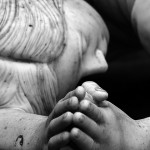We run our website the way we wished the whole internet worked: we provide high quality original content with no ads. We are funded solely by your direct support. Please consider supporting this project.
Why the 35W Bridge Collapsed – blog post 8/09/2007
As all of you know, I’m sure, a little over a week ago the 35W bridge in Minneapolis collapsed. This is the most traveled bridge in Minnesota. It was a tragedy, though the fact that only 13 people died and/or are presumed dead is really amazing, especially given that this happened at the peak of rush hour. The catastrophe is rendered especially poignant by the fact that it involved the failure of a human-made structure we instinctively trust. Like the Titanic, this collapsed bridge has become a symbol of our perpetual vulnerability.
It’s also an occasion for theological reflection. A prominent local pastor in the Twin Cities reports that the night of the collapse his eleven-year-old daughter wanted to pray that people wouldn’t blame God for the event. He told her this was a good prayer since “blame” implies God did something wrong. He assured her God let the bridge fall, in part because he wanted people in Minneapolis to “fear him.” But, he assured his daughter, God isn’t to “blame” because he did nothing wrong (you can access this pastor’s blog post here).
In this same post the pastor discusses Luke 13:1-5 where Jesus responds to two catastrophes: Pilate’s slaughtering of some Galileans and the fall of the tower of Siloam that killed 18 people. About both events Jesus asked his audience, “Do you think these people were more guilty than anyone else? No. But unless you repent, you will all perish” (vs. 3-4, my paraphrase). This pastor interprets Jesus to be saying that “everyone deserves to die,” for “all of us have sinned against God.” And this, he insists, is “the meaning of the collapse of this bridge…”
What is more, this pastor argues that catastrophes like this one are God’s “most merciful message,” since they mean there’s “still time to turn from sin and unbelief and destruction.” For this reason, the message of the collapsed bridge is “the most precious message in the world.”
Now, I respect this pastor as a man of God, but this teaching honestly concerns me. I’ll make four points in response to this blog.
First, his interpretation of Luke 13:1-5 assumes that God was somehow involved in Pilate’s massacre and the falling tower of Siloam. He thinks Jesus was teaching that the ultimate reason the Galileans were massacred and the tower fell on people was because “everyone deserves to die,” and Jesus was simply saying to his audience; “You’re as guilty as they are, and you’ll die too if you don’t repent.” But where in the text is there any suggestion Jesus assumed God had anything to do with either of these catastrophes?
In fact, if you read on five more verses, you come upon another catastrophe Jesus confronted: a woman who had been deformed for 18 years. Rather than assuming that God was somehow involved in this deformity, Jesus says this woman was bound by Satan (13:16). He then manifested God’s will by healing her.
This is what we find throughout the Gospels. They uniformly identify infirmities (sickness, disease, deformities, disabilities) as being directly or indirectly the result not of God’s punishing activity, but of Satan’s oppressive activity. So it is that Peter summarized Jesus’ ministry by saying he was anointed “with the Holy Spirit and power” and “went around doing good and healing all who were under the power of the devil” (Ac 10:38).
In light of this, I see no reason to accept the assumption that drives this pastor’s exegesis.
Second, while I agree with this pastor that all people are sinners who deserve to die, I wonder how the death of Christ factors into all this. Scripture teaches that Jesus died “not just for our sins, but for the sins of the whole world” (I Jn 2:2). If so, then why is God still in the business of physically punishing people for their sins by sending catastrophes? Wasn’t Jesus’ sacrifice enough?
Certainly God has the right to punish people by taking back the life he gives when he sees fit (e.g. Acts 5:9-10). But in the light of Calvary – and the entire ministry of Jesus – why should we think that this is his post-Christ ordinary mode of operation? Isn’t the Good News good precisely because, despite our sin, Jesus came to give us abundant life (Jn 10:10)?
Third, and closely related to this, the model of God bringing about disasters to punish people is rooted in the Old Testament. Here we several times find God using nature and human agents to punish people. (Though even back then this wasn’t God’s normal mode of operation). But in these contexts, God first gives ample warning about a coming judgment and he tells people exactly what he is doing. Punishment without teaching is not pedagogically effective.
Imagine a parent saying to their child, “I’m going to spank you whenever I want to but not tell you why.” It just doesn’t work!
Now, God is no longer working within the framework of the Old Covenant in which these judgments have meaning, so we have no reason to think God is still trying to teach people lessons by sending disasters. But even if we were to suppose he was still operating this way, where are the warnings and the teachings? If God was in fact collapsing the bridge to make people in Minneapolis “fear him,” as this pastor claims, why didn’t God establish a context where the people would understand what God was up to and have a chance to repent?
I can make my point this way. How many non-believers in Minneapolis do you think interpreted the bridge collapse as an expression of God’s wrath? And of these, how many were moved to turn to God out of fear? I’m thinking it’s probably close to zero. If God was trying to get people to fear him, it simply didn’t work. But it did cost a number of lives and inflicted misery and sorrow on many more. It was a harsh spanking without any helpful instruction, and thus was unhelpful while being costly. Is this the way the God revealed in Jesus Christ operates?
Fourth, and finally, if you accept that angels and humans are free agents who thus have the capacity to go against God’s will, there’s simply no need to appeal to a vindictive divine purpose to explain why catastrophes like this collapsed bridge happen. As Scripture depicts the matter, the world is oppressed by rebellious, evil powers that in a variety of ways and at a variety of levels have corrupted nature. As I’ve discussed at length in previous blog posts, nothing in nature operates exactly the way God originally intended it to operate (see Satan and the Corruption of Nature: Seven Arguments).
On top of this, we humans have allowed ourselves to be co-opted into the epoch long battle these powers are waging against God, so we too have become corrupted. We thus don’t have the right priorities, which in part is why bridges we build sometimes collapse. Think about it. To give one illustration, we are generally much quicker to spend billions of dollars on war than we are making sure people are safe (and adequately fed).
There’s undoubtedly plenty of blame to go around for why this bridge collapsed, ranging from fallen cosmic powers to a wrongly prioritized government to the wrongly prioritized people who elected these officials into office without holding them sufficiently accountable. But if you accept that God created a world with free agents, the one being you don’t need to blame is God.
If, on the other hand, you don’t accept that the cosmos is populated with free agents who can therefore make decisions that are contrary to God’s will, then you have an even greater problem. (This is the camp the pastor whose blog I’m discussing is in). For in this case one has to explain how everyone can deserve to die when everything every person has ever done, however sinful, was part of God’s great plan from the start!
Not only this, but if angels and people don’t have free will that can go against God’s will, then it’s no longer adequate to say that God “allowed” a bridge to fall. You have to instead say that God “caused” the bridge to fall. Other agents may have been instrumental in bringing about the collapse of the bridge, but they only did what God’s sovereign plan decreed they would do. So one is fudging words to say God “allowed” the bridge to fall and that God is not to blame for the bridge falling.
In the end, this view requires that we accept that God punishes people with catastrophes — and then eternally in hell — for doing precisely what he predestined them to do. Good luck making sense out of that!
I suggest it’s far more biblical, and far more rational, to simply say that in a fallen, oppressed world, bridges sometimes collapse — and leave it at that. Rather than trying to see the vindictive hand of God behind catastrophes, it’s wiser to simply acknowledge that the world is an oppressed place where things sometimes go tragically wrong and focus all of our mental and physical energy turning from our self-centered ways to carry out God’s will “on earth as it is in heaven.”
That, after all, was what Jesus was getting at in Luke 13:1-5.
Category: General
Tags: Current Events, Free Will, Open Theism, Predestination
Topics: Open Theism, The Problem of Evil
Related Reading

What Does a Perfect God Look Like?
The “classical view of God” refers to the view of God that has dominated Christian theology since the earliest Church fathers. According to this theology, God is completely “immutable.” This means that God’s being and experience never changes in any respect. God is therefore pure actuality (actus purus), having no potentiality whatsoever, for potentiality is…

Greg on the Open View: Video One
By popular demand, we’re sharing the first of Greg’s video presentations on the Open View of the future. If you enjoy it, you can find the rest of the series entitled A Flexible Sovereignty: A Biblical Understanding of Providence and the Nature of the Future by clicking here. This video was recorded in 2008 at Azuza…

Why Prayer Matters
Two questions about prayer: What possible difference can prayer make to an all-good and all-powerful God? Why would an all-wise God leverage so much of his will being done on earth on whether or not his people talk to him? These questions began to be resolved for me when I began to think about prayer…

What is the significance of Numbers 14:12–20?
In response to Israel’s bickering the Lord says “I will strike them with pestilence and disinherit them, and I will make of you [Moses] a nation greater and mightier than they” (vs. 12). Moses asks the Lord to forgive the people, and the Lord eventually responds, “I do forgive, just as you have asked” (vs.…

Free Will: The origin of evil
In this continuing series on free will, Greg discusses how evil can only be accounted for if we acknowledge free will. This is especially true if you believe that God is good.

What is the significance of 2 Chronicles 12:5–8?
The Lord allows King Shishak of Egypt to almost conquer all of Israel because of King Reheboam’s rebellion. “You abandoned me, so I have abandoned you to the hand of Shishak” (vs. 5). The officers and king repent, so the Lord responds by saying, “They have humbled themselves; I will not destroy them, but I…
